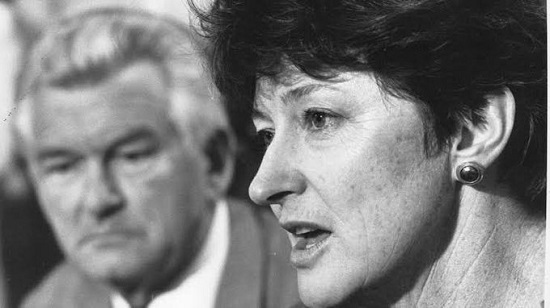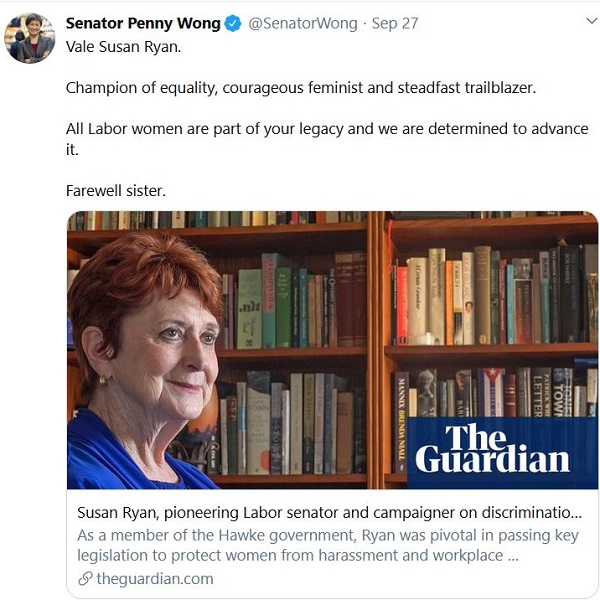
This ABC story says:
- Ms Ryan served as a minister in Bob Hawke’s Labor government, holding titles including special minister of state, minister for education and minister assisting the prime minister for the status of women.
She was the first woman to hold the portfolio relating to women’s affairs, and the first female minister from the Labor Party.
Key laws enshrining opportunity and rights for women were legislated on her watch, including the Sex Discrimination Act.
She would later be quoted as calling the Sex Discrimination Act “probably the most useful thing I’ve done in my life”.
Luke Henriques-Gomes at The Guardian gives a sensitive outline of Susan Ryan’s life-work in Susan Ryan, pioneering Labor senator and campaigner on discrimination, dies aged 77.
Her work continued after leaving parliament:
- Upon leaving parliament, Ryan remained involved in human rights causes, headed the Association of Superannuation Funds of Australia, served as a pro-chancellor of the University of New South Wales, and was briefly deputy chair of the Australian Republican Movement.
She was made an officer of the Order of Australia in 1990.
Ryan returned to public life in 2011 when she was headhunted to serve as the age discrimination commissioner, and then added disability discrimination to her roles at the Human Rights Commission in 2014.
Last year, she was appointed as a fellow at the Whitlam Institute leading research into gender inequality.
The ABC story conveys a number of tributes including from ACT Labor Senator Katy Gallagher, who said:
- “Not only did she pave the way, she built the road that many of us have followed.”
And Penny Wong:

In that ABC link there is a reference to what Paul Keating said, which I heard in full, when spoke with Geraldine Doogue. Apart from gender and equality issues, he said she made a major contribution to education.
When I went to university in the 1960s only about 10% of young people going to secondary school graduated with eligibility to go on to university, if they could afford it, with the most able assisted by a ‘Commonwealth scholarship’.
After the Whitlam reforms 3 in 10 completed secondary school, and university was free. Keating said most of the 3 of 10 were boys. He said that under reforms carried by Susan Ryan amplified the opportunity to complete secondary school to 9 out of 10, transforming the educational opportunities of all Australians. With university reforms carried by John Dawkins, 40% of those went on to tertiary education. keating said that while governments paid for the expansion of schooling, the vast expansion of tertiary study made HECS loan funding necessary. Keating said, then we tipped in an extra $1 billion pa to boost TAFE.
That was back when politicians concentrated on making Australia great.
However, in truth the ALP back then was no kindergarten playground. Ryan’s friend, Jesuit priest Michael Kelly relates how Ryan handled the reality she faced:
Politics was her chosen field and the Australian Labor Party was her chosen platform. Politics in general and the Labor Party in particular are nothing if not also magnets for hatred. The ALP breeds haters and they can do their damage in spreading what is a social disease that thwarts human potential and chokes possibility.
Susan would have nothing of it. She was no hippy of the ‘60s and ‘70s but she refused to be caught in the vortex of hate. And where that was most evident was in the way she dealt with people who had done everything to thwart her purposes in the endless struggles of Labor Party factions and personalities.
For people who had done their best to hurt and impede her, all Susan could do was park her anger, look forward and take the next step as if the dark misbehavior had not happened. Susan was – in ways I had never seen in the ALP or elsewhere – nothing if not a forgiving soul whose generosity extended even to enemies.
Father Kelly says of her that she was Catholic to the core. Her:
Catholicism – [which] for better and for worse – was tribal Irish Australian in its complexion.
Her introduction to the Irish Australian tribe was through the Brigidine Sisters in Maroubra where the most influential figure in Susan’s life was Sister Helen Connolly. Helen died young of cancer – in her 50s. But the impact on her life was something Susan returned to regularly. The essence of the Brigidine spirit is captured in the Latin phrase they used as the motto in many of their schools – fortiter et suaviter in Latin or strength and gentleness in English.
Are there any two better words to capture Susan Ryan?
Vale Susan Ryan. You made a real difference to all our lives.

New post alert.
Those are poignant remarks on hatred, Brian.
Politics as a magnet for hate.
The ALP as a breeding ground for hatred.
It puts my dismay at the labyrinthine ways of the Victorian ALP, and its branch-stacking; and the factionalism in the Liberal Party; the Barilaro explosion in NSW; the deep enmities fostered by Stalinist Party practices; etc. ad nauseam into a much wider and therefore truer realm.
Humans can be beastly to each other.
Humans can be beastly to the Planet.
“All power tends to corrupt……”
PS: also Susan Ryan’s reaction to beastly acts, shows the enduring effects of some teachings of Jesus the Nazarene.
Vale Susan Ryan.
Ambi: “Politics as a magnet for hate.” Part of the problem with politics is that, too often, it is the numbers count. The party or faction with the numbers gets its way all the time no matter how good their opponents arguments are.
Bob Hawke was famous for driving for consensus. I remember somewhere seeing a claim that when Bob was ACTU president nothing ever went to a vote because he insisted that things be thrashed out.
He was also famous as Prime minister for doing the same thing with cabinet. It meant things were thrashed out, problems exposed and proposals perfected.
Guess someone like like Susan Ryan had a chance of thriving in that environment.
yes.
Quite a stark difference between ALP and the greens in the Hawke days, that’s for sure.
Jumpy: “Quite a stark difference between ALP and the greens in the Hawke days, that’s for sure.” What exactly are you babbling on about?
John, as far as I recall, there was “Save the Franklin River”, “Save Lake Pedder” in Tassie; the ACF was a strong volunteer lobbying group, but no Greens Party yet existed…. in the early Hawke days.
Gareth Evans earned the nickname “Biggles” by sending RAAF planes over the Gordon/Franklin Rivers area to see if the Tas State Govt was illegally beginning a dam. The ALP Hawke Govt got that area listed as a World Heritage Site, si?
Later, Hawke interfered in a mining area of WA because of local indigenous rights. Hawke was pro-union but not blindly committed to all mining and industrial projects proposed.
There was certainly a difference between the Federal ALP and the Movement Against Uranium Mining (MAUM).
As far as I remember, die Gruenen (The Greens) had been electorally successful in West Germany for several years, in the early 1980s, before a Green Party was established in Tassie; later in other States.
John, read what you wrote and then what I wrote, if you can’t join the obvious dots then I can’t help you on this point.
That said, goodnight all, sleep well and bounce out of bed tomorrow.
Wikipedia says The Greens were formed in 1992, Dee Margetts was elected WA senator in 1993, joined by Bob Brown in 1996.
In Germany Die Grünen kicked off in 1980. As far as I can see they have never risen to double figures in the federal elections, but because of the more democratic system get representation proportional to their vote.
The big break was 1998 when they were in coalition with the SPD and Joschka Fischer became Vice-Chancellor of Germany and foreign minister. They seem to do better at the state level, where:
The party holds seats in fourteen of Germany’s sixteen state legislatures, and is a member of coalition governments in eleven states. Winfried Kretschmann, Minister-President of Baden-Württemberg, is the only Green head of government in Germany. The Landtag of Baden-Württemberg is also the only state legislature in which Alliance 90/The Greens is the largest party; it is the second largest party in the legislatures of Bavaria, Hamburg, and Hesse.
My recall is that the Baden-Württemberg takeover happened because they opposed cutting down some trees in Stuttgart, where the proposal was to build a new node connecting rail networks from SW to east. Their junior partner was the conservative CDU, Merkel’s party
Deutsche Welle did a piece on their 40th anniversary.
At state level they seem to poll consistently in the 20s.
I think the German system of politics, largely adopted by NZ, is more conducive to civilized politics than ours.
I have different mail on Hawke’s cabinet style. My impression was that his real skills were in conflict resolution rather than consensus building.
I remember Kim Beazley saying the Hawke wanted consensus, but often couldn’t get it, because there were some pretty strong and stubborn people in his cabinet.
At times when consensus couldn’t be reached Beazley said what people around the table wanted was a captain’s call from Hawke. It used to drive Beazley mad, because they kept going around in circles.
Ambi, I don’t know about hate and factionalism in NSW and Victoria, but what I have experienced here is quite mild. Most ALP members I have met think factionalism is unproductive and stupid.
The draft ALP national platform has just hit the deck. It has a whole chapter on how we could/should improve the way our democracy works.
Yes, and I’ll have to turn my mind to climate.
Brian, thanks for the insight from Beazley re Hawke. I am one of those who believed he was good at consensus. Conflict resolution makes far more sense.
Differences if viewpoint are to be expected.
But organised “factions ” with factional chiefs and powerbrokers can be a problem.
Rife in Victoria at the senior levels of the Liberal and Labor Parties. But I don’t know what its like at suburban Branch level.
And Mr Turnbull was greeted with loud laughter when he told a NSW State Council (Libs), “We don’t have factions “.
Trying to paint a contrast with Labor? Inept.
Brian: The Greens aspire to consensus but have a mechanism that will take a decision to a vote if consensus cannot be achieved. Briefly, during a decision process someone can announce that they will block consensus if they don’t agree with the majority position. If this happens attempts will be made to resolve the situation. (Includes things like side meetings.) However, in the end, if consensus cannot be reached, a vote will be held and the majority view will prevail.) Seems to work.
John, sounds a good way to go.
I believe the Japanese are culturally committed to consensus. Makes for smooth implementation once the matter is decided, or so the theory goes.